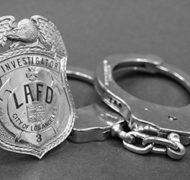Why Guilt-Ridden People Make Better Leaders
Blog / Produced by The High Calling
The head of security, Fred, poked his head into my office the other day and asked if I was busy.
“Uh…well, I’m going to lunch,” I said. It was 12:15, and my stomach was growling.
Fred doesn’t usually show up around here in the executive suite, so it seemed a little suspicious. But, whatever. Maybe he was looking for a lunch date.
He stood there at my office door, looking awkwardly down at the floor while pawing his foot into the carpet, then he commented on the colorful print hanging on my office wall.
“Yes,” I agreed, as we both fixed an admiring gaze towards it. “It has a soothing effect, don’t you think?” Fred nodded.
We chatted for a couple more minutes about this and that, and then he suddenly swooped in for the kill.
“Your name has come up for a random drug test,” he abruptly announced, as if cramming the entire sentence into one lengthy, multi-syllabic word.
Ah. So that’s why Fred is here.
Our company, like many others, has a random drug screening program. Fred asked if I would mind being escorted to the occupational health unit.
“Sure!” I exclaimed enthusiastically as I jumped out of my chair, suddenly feeling the compulsion to sound overly innocent and pure. Meanwhile, a rush of terrorizing thoughts ran through my head.
“Did I take any drugs last night? No, duh, of course not! But what about wine? Does that count? Dear Lord - I had two glasses of wine! And on a weeknight! Wait - what about those fish-oil pills? I think I read somewhere they test positive. Oh no! My acid reflux prescription! That will surely show up as cocaine or something! No, no, no, no, no!”
I tried to maintain a low profile walking down the corridor as the panic of guilt-ridden thoughts swept over me. Eventually, I worked up enough courage to ask the most dreaded question of all:
“Will I have to pee in front of you?”
Fred chuckled. “Only if you tamper with the evidence.” I made a mental note to follow the instructions very, very carefully.
Other than a few post-surgery pain-killers, I don’t take drugs, and never have. Yet when Fred asked me to take the perp walk down to occ health that day, I immediately felt guilty by default. It’s like guilt is my presumed baseline.
Rather than seeking immediate therapy, I take solace in the fact that guilt has proven to be a good thing in corporate settings. Research shows that guilt-ridden people are more productive and better workers.
Those who are more prone to guilt received higher performance ratings from their bosses. Related studies showed that guilt-ridden people were seen as stronger leaders by their peers.
The thinking is that guiltier people have a keener sense of responsibility for their actions. You know, like, maybe they actually care about the rules and ethics and values?
Another upside to guilty personalities: they are more satisfied in their jobs, more committed to their organizations, and less stressed than others. And - here’s the clincher - they are more selfless. Specifically, the guilty are prone to be more willing to make charitable contributions and help other colleagues in need.
Sounds like the model leader.
So don’t feel so guilty for feeling guilty. Embrace it, nurture it, let guilt be your guide. And don’t forget to thank your parents or the nuns or pastors next time you see them, because all of that tyranny has helped you succeed.
“You’re free to go, Mr. Wood,” Fred said with a satisfied smile after he examined the test results.
Come on. He knew I was innocent all along, right?
Right?
Post by J.B. Wood.
Image by Los Angeles Fire Department. Used with permission. Sourced via Flickr.




